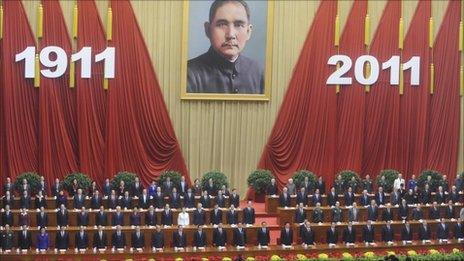Beijing cautious on republic centenary
- Published

Beijing says Sun Yat-sen opened the door, but the Communist Party built modern China
As China marks the centenary of the 1911 Revolution, which ended 2,000 years of imperial rule and led to the founding of modern China, the subject is being treated carefully by the authorities.
It was Sun Yat-sen who led the revolution against the Qing empire and founded Asia's first republic - the Republic of China. He remains highly respected by almost all Chinese in the mainland, Taiwan and elsewhere in the world.
The Communist Party overthrew the republic in 1949, forcing it to retreat to Taiwan. But in order to boost its own legitimacy and promote reunification, the party says it has inherited Sun's cause.
At a ceremony held in Beijing on Sunday, President Hu Jintao hailed Sun's "thoroughly modern, national and democratic revolution", saying that it "opened the door of progress for China and searched for ways for the Chinese nation's development and progress".
The way forward was eventually found "through painstaking efforts and enormous sacrifices", said Mr Hu.
"The correct path is the path of socialism with Chinese characteristics, and the core force is the Chinese Communist Party," he emphasised.
Mr Hu also took the opportunity to call for peaceful reunification with Taiwan.
"Rejuvenating China, which was the cherished goal of Dr Sun Yat-sen and other pioneers of the Revolution of 1911, should be the common aspiration of all compatriots on both sides of the Taiwan Strait," the official Xinhua news agency quoted him as saying.
Democracy debate
But the party line is not being observed by all.
According to Hong Kong's South China Morning Post, the anniversary has helped revive debate about democracy and political reform.
For liberal intellectuals, ideas of constitutional democracy that ignited the revolution 100 years ago are still very much alive, the paper said.
In discussions among intellectuals and students, parallels have been drawn between the present era and the dying years of the Qing empire, when corruption and political stagnation eventually led to revolution.
The Qing court failed to prevent revolution because it was reluctant to carry out meaningful constitutional reforms, Lei Yi, a historian at the Chinese Academy of Social Sciences, said at a recent forum in Beijing.
Fu Guoyong, a prominent author on China's modern history, wrote in his blog: "This land and its people are trapped in a historical predicament that bears surprising resemblance to the situation 100 years ago."
Alarmed by these parallels, officials have imposed limitations on commemoration events and centenary-related publications.
Some seminars and student debates have been called off without explanation. Books on the revolution have been scrutinised in line with a strict censorship programme, Hong Kong media said.
As a microblogger pointed out, the authorities are in an awkward position over the centenary.
"It is definitely unfeasible not to commemorate it, as Taiwan might gain control over the discourse. But it is also difficult to mark it - how should the legacy of the Republic of China be interpreted?" the microblogger said on the Weibo website.
Maoist anger
Beijing also faces pressure from the left, who do not like the way Sun Yat-sen's legacy is elevated sometimes at the expense of Mao Zedong, founder of the People's Republic.
In its 1 October editorial marking the 62nd founding anniversary of the communist state, the official newspaper People's Daily praised Sun's revolution but made no mention of Mao.
The omission provoked angry protests from conservative quarters. An article on the Maoist website Utopia questioned, "Who was greater, Mr Sun or Chairman Mao?"
"The capitalist roaders who hold power within the party have become so shameless that it is making me bristle with anger," said another article on the website.
- Published10 October 2011